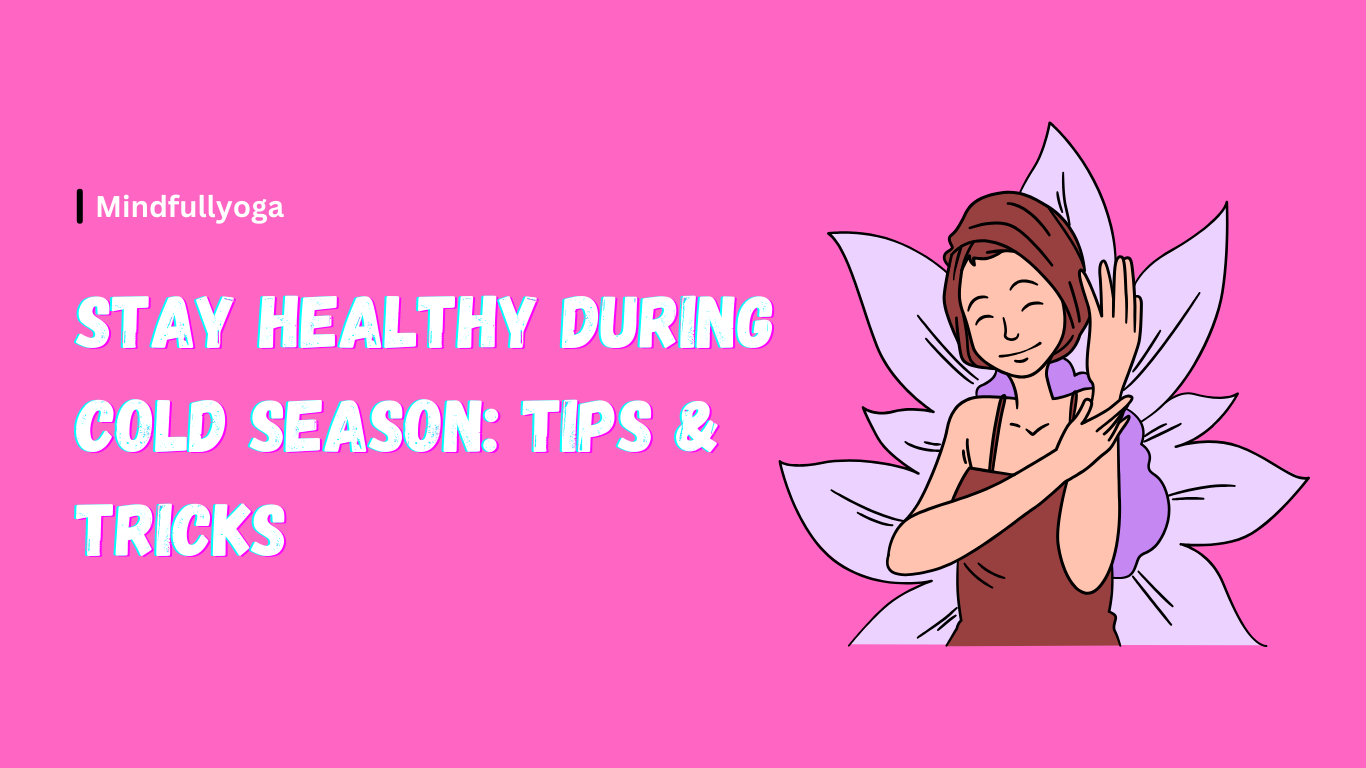
As the cold season comes, you might wonder how to stay healthy. It’s key to prevent illnesses and keep well. To stay healthy, knowing the risks and taking steps to protect yourself is vital. This article will teach you how to stay healthy, including boosting immunity and practicing good hygiene.
By following these tips, you can lower your chance of getting sick. Learning to stay healthy during cold season helps you control your health. Stay healthy by being informed and taking the right precautions.
Key Takeaways
- Understanding the risks of cold season is key to staying healthy
- Building immunity through healthy habits is essential
- Practicing good hygiene can help prevent the spread of illnesses
- Creating a healthy environment can reduce your risk of getting sick
- Learning how to stay healthy during cold season can help you take control of your health and well-being
- Stay healthy during cold season by being informed and taking the necessary precautions
- How to stay healthy during cold season is a topic that requires attention and action
Table of Contents
Understanding Cold Season and Its Impact on Your Health
To stay healthy during cold season, knowing how illnesses spread is key. The cold season starts in late fall and ends in early spring. The cold weather and low humidity help viruses spread more easily.
It’s important to understand why we get sick more in cold weather. The cold air dries out our nose and throat, making them more open to viruses. Also, being indoors more in the cold makes illnesses spread faster.
Common Cold-Season Illnesses
- Influenza (the flu)
- Common cold
- Respiratory syncytial virus (RSV)
- Norovirus
Knowing how to stay healthy during cold season helps protect you and your family. Practice good hygiene, get enough rest, and stay informed. This way, you can avoid common illnesses.
How to Stay Healthy During Cold Season: The Basics
To stay healthy during cold season, focus on the basics. A good approach includes eating right, exercising, sleeping well, managing stress, and practicing good hygiene. These steps help build a strong immune system and keep you well.
A balanced lifestyle is essential for health. Eat foods full of nutrients, drink lots of water, and do exercises that fit your level. Also, sleep enough and use stress-reducing activities like meditation to boost your immune system.
- Eat a balanced diet rich in fruits, vegetables, whole grains, and lean proteins to support immune function.
- Limit sugary drinks and drink lots of water to stay hydrated.
- Engage in regular physical activity, such as walking, jogging, or yoga, to keep your body and mind active.
- Practice good hygiene by washing your hands frequently, especially after coughing or sneezing, and before eating.
By making these habits part of your daily life, you’ll learn how to stay healthy during cold season. Your best protection against disease is a strong immune system. The biggest way to support this is to adopt a healthy lifestyle. Keep in mind that over time, small adjustments can have a significant impact. The secret to creating lasting habits is consistency.
Building Your Immune Defense Shield
To stay healthy during cold season, building your immune defense is key. This means making lifestyle choices that boost your immune system. By doing so, you can stay healthy and strong.
A strong immune system fights off cold-season illnesses well. To strengthen it, add natural boosters like vitamin C foods, probiotics, and herbs like echinacea to your routine. Also, regular exercise, stress reduction, and social connections are important for a strong immune system.
Natural Ways to Boost Immunity
- Consume foods high in vitamin C, such as citrus fruits and leafy greens
- Include foods rich in probiotics like kefir and yogurt in your diet
- Try herbal supplements, like echinacea, to support immune function
Lifestyle Habits for a Stronger Immune System
Regular exercise, stress reduction, and social connections boost your immune system. By focusing on these habits, you can keep your body healthy during cold season. Aim for 30 minutes of moderate exercise daily, practice stress-reducing activities, and stay connected with loved ones.
Essential Hand Hygiene Practices
To stay healthy during cold season, good hand hygiene is key. It’s one of the best ways to stop illnesses from spreading. Hand washing is a top defense. Wash your hands often, after blowing your nose, coughing, sneezing, and before eating.
For proper handwashing, use warm water and enough soap to cover your hands. Lather your hands by rubbing them together. Make sure to clean all parts, including the backs of your hands, wrists, and under your nails. This should take at least 20 seconds. Humming the “Happy Birthday” song twice can help you remember the time.
- In the absence of soap and water, use hand sanitizer.
- To stop germs from spreading, don’t contact your mouth, nose, or eyes.
- Clean your hands after using public transportation, before preparing food, and after being in crowded areas.
By making hand hygiene a daily habit, you can lower your risk of getting sick. Good habits like hand hygiene, a balanced diet, regular exercise, and enough sleep are all important. Follow these tips to stay healthy and thrive all year.
Nutrition Strategies for Winter Wellness
To stay healthy during cold season, focus on nutrition that boosts your immune system. Eating a balanced diet full of essential nutrients is key. A healthy diet is essential to your general health.
A well-planned diet helps fight off infections by providing necessary nutrients. Key nutrients include vitamin C, vitamin D, and zinc. You can find these in fruits, vegetables, whole grains, and lean proteins.
Immune-Boosting Foods
- Citrus fruits, such as oranges and grapefruits, which are high in vitamin C
- Salmon and other fatty fish are high in vitamin D
- Leafy greens, such as spinach and kale, which are packed with antioxidants and other essential nutrients
Hydration Tips for Cold Weather
Staying hydrated is key, even in cold weather. Aim for eight glasses of water or more each day. If you’re active or live in a dry climate, drink more. Hydrating foods like soups and stews also help meet your fluid needs.
Seasonal Superfoods to Include
There are seasonal superfoods that support your health during cold season. Sweet potatoes, Brussels sprouts, and pomegranates are great examples. Adding these to your diet can keep you healthy and provide the nutrients you need.
The Power of Regular Exercise in Cold Weather
As you face the cold season, keeping your body healthy is key. Learning to stay healthy means more than just avoiding sickness. It’s about being active too. Exercise boosts your immune system, improves blood flow, and makes you feel better overall.
It’s important to find an exercise routine that fits your life and likes. You can go for walks, runs, or bike rides outside, but remember to wear warm clothes and drink water. On days you can’t go outside, try yoga, bodyweight exercises, or dancing. The aim is to enjoy it and keep it going.
The following advice can help you workout in the cold:
- Dressing in layers to keep warm
- Warming up slowly to avoid injuries
- Drinking lots of water to stay hydrated
- Listening to your body and taking breaks
By following these tips and making exercise a priority, you can stay healthy during the cold season. You will also benefit from the many advantages of consistent exercise.
Creating a Healthy Indoor Environment
To stay healthy during cold season, focus on your indoor environment. It’s key to keep it balanced for wellness and to stop illnesses. A healthy indoor space protects your respiratory system and overall health.

Staying healthy indoors is important. You can make your space healthier in several ways. Here are some important steps:
Optimal Home Humidity Levels
Keeping your home’s humidity right is vital. Dry air can irritate your respiratory system and make you more likely to get sick. Aim for humidity between 30-50%. A humidifier can help you reach this level and stay healthy.
Air Purification Methods
Air purification is also key for a healthy home. Use air purifiers, plants, or natural ventilation to improve air quality. These methods remove pollutants and allergens, helping you stay healthy.
Temperature Control Tips
Temperature control is also important. Find a balance between comfort and health. Too warm temperatures can dry out the air and weaken your immune system. Aim for a comfortable temperature that doesn’t harm your health.
Stress Management During Peak Cold Season
To stay healthy during cold season, managing stress is key. When you are stressed, your body releases cortisol and other hormones. These hormones can weaken your immune system, making you more likely to get sick. Knowing how stress impacts your health is crucial.
There are many ways to manage stress during cold season. Deep breathing exercises and meditation are examples of mindfulness techniques that can help you relax. Regular exercise, such as yoga or walking, can also help reduce stress and improve your mood.
- Meditation and mindfulness practices can help you relax.
- Engage in regular exercise, such as yoga or walking, to reduce stress and improve mood
- Connect with friends and family to maintain social connections and seek support when needed
Keeping in touch with friends and family is also important. It helps you feel less alone during winter. By using these stress-management techniques, you can stay healthy and avoid getting sick. Remember, taking care of your mental health is just as important as your physical health during cold season.
Vitamin and Supplement Recommendations
To stay healthy during cold season, it’s key to think about vitamins and supplements. These can boost your immune system. Adding the right vitamins and supplements to your routine can really help.
A balanced diet is important, but sometimes supplements are needed. Consult a health care professional before starting any new supplement regimen.
Essential Vitamins for Winter Health
Some vitamins are very important for your immune health in winter. Vitamins D, C, and E are great for this. Vitamin D helps your immune cells work well, and vitamin C is full of antioxidants. Vitamin E also helps your immune system and protects cells.
Natural Supplements for Immune Support
There are also natural supplements like elderberry, echinacea, and zinc that support your immune system. Elderberry fights viruses, and echinacea can lessen cold symptoms. Zinc has an important role in immune cell activity and prevention of infection. Always follow the recommended amounts and talk to a healthcare provider before using them.
By adding these vitamins and supplements to your routine, you can stay healthy during cold season. Always remember to eat well and live a healthy lifestyle. And don’t forget to talk to a healthcare provider before adding new supplements.
Protective Measures When Going Outside
When you go outside in the cold, it’s key to protect yourself. Knowing how to stay healthy means wearing the right clothes and gear. Initiate with a base layer that wicks away moisture, followed by insulation layers, and finish with a top layer that is waterproof.
Protect your nose, mouth, and ears from cold air. Use a scarf, mask, or balaclava. These help prevent dryness and irritation, lowering infection risk. Also, wear warm, waterproof gloves or mittens to keep your hands dry and warm.
Here are some tips for going outside in the cold:
- Wear warm, waterproof shoes with good grip to avoid slipping on ice
- Use sunscreen with at least SPF 30, even on cloudy days, to shield your skin from UV rays
- Drink lots of water or warm drinks like tea or hot chocolate to stay hydrated
You can relish the outdoors safely by following these guidelines. Remember, staying healthy is a continuous effort. Your well-being depends on your promptness.
Common Cold Season Myths Debunked
It’s key to know the truth about staying healthy during cold season. Many myths surround this topic. Understanding what’s real can help you make better health choices.
Science has debunked many myths about getting sick. For example, cold weather doesn’t directly cause colds. Colds come from viruses, not the cold itself. Knowing how to stay healthy can lower your risk of getting sick.
Facts vs. Fiction About Getting Sick
There is no truth in the saying, “Feed when you have a cold, starve when you have a fever.” Research shows this doesn’t work. Instead, eat when you’re hungry, no matter if you’re sick. You can maintain your health by doing proper deeds.
Scientific Evidence Behind Popular Remedies
Some cold remedies work, while others don’t. Zinc lozenges can shorten a cold, but echinacea doesn’t help. Knowing the science behind these can guide your health choices.
By debunking myths and knowing the facts, you can stay healthy during cold season. Always prioritize your health and take steps to protect yourself.
Warning Signs: When to See a Healthcare Provider
Learning how to stay healthy during cold season is key. Knowing when to see a doctor is just as important. Look out for warning signs like a fever over three days, trouble breathing, or cold symptoms that won’t go away.
Some people are more at risk, like young kids, older adults, and those with chronic illnesses. If you’re in one of these groups, watch out for these signs:
- A fever above 102°F
- Severe headache or stiff neck
- Chest pain or coughing up blood
- Severe fatigue or confusion
When you talk to your doctor, tell them all about your symptoms. Share when they started and how long they’ve lasted. This helps your doctor figure out the best treatment for you. If you see any of these symptoms, seek medical assistance immediately.
Building Healthy Habits That Last Beyond Cold Season
To stay healthy during cold season, it’s key to build habits that boost wellness. Focus on staying healthy to lower illness risk and keep your immune system strong. Key practices include regular hand washing, eating well, and staying active.
Creating lasting habits needs a smart plan. Start by setting achievable goals, tracking your progress, and facing challenges head-on. For example, plan your day for exercise, meals, and stress relief. This way, you can stay healthy not just during cold season but all year.
Effective strategies for healthy habits include:
- Creating a routine for physical activity, like walking or jogging
- Planning meals ahead for a balanced diet
- Using stress management, like meditation or deep breathing
By adding these habits to your daily life, you can stay healthy during cold season and beyond. It’s all about making healthy choices and sticking to them.
Emergency Preparedness for Cold Season
To stay healthy during cold season, being prepared is key. You need a plan and a winter health kit. This kit should have over-the-counter meds, first aid, and comfort items for cold and flu symptoms.
Being ready is important for staying healthy. The right supplies can help manage illness and prevent worse problems. Here are some must-haves for your winter health kit:
- Over-the-counter medications for pain and fever relief
- First aid supplies, such as bandages and antiseptic wipes
- Comfort items, such as warm blankets and thermometers
It’s smart to buy these items before the cold season starts. Check expiration dates and store them right. Also, have emergency contact info ready and know about local health services and emergency numbers.
The Role of Preventive Healthcare
To stay healthy during cold season, focus on preventive healthcare. Regular check-ups with your doctor can spot health issues early. This makes you more resistant to cold-season illnesses. By being proactive about your health, you lower the chance of getting sick.
Some important preventive steps include:
- Annual flu shots to protect against the flu virus
- Health tests to identify any underlying medical problems
- Regular vaccinations to prevent illnesses such as pneumonia and influenza
These steps help you understand how to stay healthy, not just during cold season but all year. By making preventive healthcare a part of your routine, you can control your health and lower illness risk.
Barriers to preventive care include lack of time, cost, and not knowing enough. But, many doctors offer flexible schedules and affordable care. By overcoming these barriers and focusing on preventive healthcare, you can greatly improve your health during cold season and beyond.
Maintaining Wellness Throughout Cold Season
Staying healthy in the cold season is all about a big picture approach. We’ve talked about boosting your immune system, keeping clean, and handling stress. These steps help you face winter with strength and hope. Remember, every little bit counts for your health.

Think of health as a whole package, including good food, exercise, and check-ups. Taking care of yourself helps keep illnesses away and lets you enjoy winter fully. With the right habits, you can stay full of energy and life all season long.
Be alert but don’t let fear of getting sick stop you. Learn how to stay healthy during cold season and make the most of winter’s magic. Your health is your most precious gift – take care of it with passion and attention.
Also Read: Boost Your Health and Wellness at Work: Expert Tips
Also Read: Powerful Meditation for Forgiveness and Letting Go
Also Read: Ayurvedic Remedies for Varicose Veins: 4 Natural Ways




